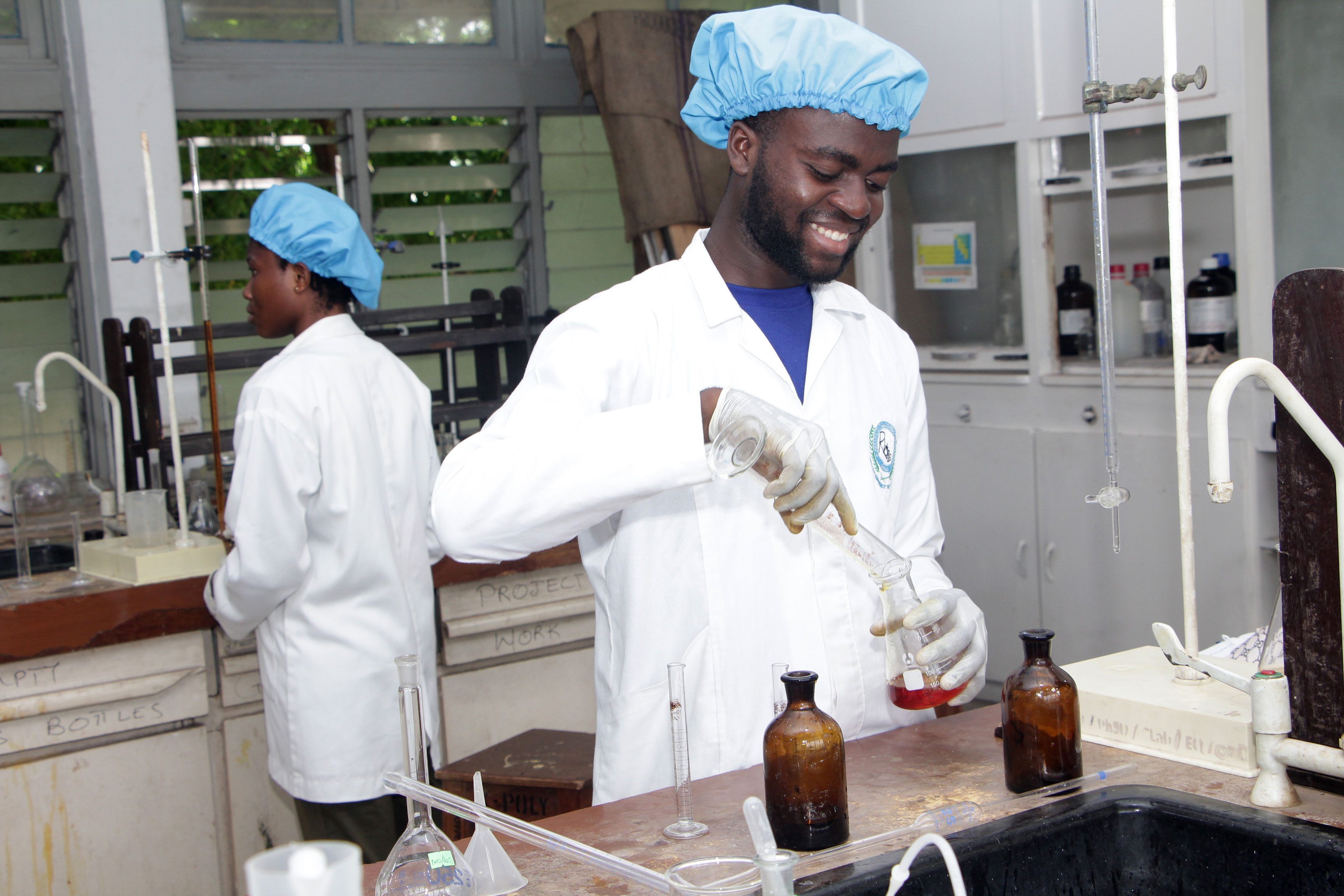
Bachelor of Technology (BTech) is an undergraduate degree that is awarded after a student has completed a required set of courses in a particular discipline. It is similar to BSc (Bachelor of Science), however, the BTech is more practical-based.
The BTech in Pharmaceutical Sciences Programme offered at Kumasi Technical University has been designed to train students to acquire technical knowledge and skills required for effective and efficient execution of tasks, especially in the manufacture of quality pharmaceutical, chemical and herbal products. Individuals gain in-depth knowledge and skills on what is involved in the formulation of medicines, and how the finished products can be analyzed.
Components of the Programme
Students are taken through courses such as pharmaceutical manufacturing; dosage forms (solid, semi-solid, liquid); pharmaceutical microbiology and applied pharmaceutical microbiology; analytical, organic and medicinal chemistry; plant medicine; physiology; pharmacology; research methods. In addition to these core courses, students take mandatory ones such as communication skills; computer literacy; African studies; mathematics and statistics; entrepreneurship. Students also take mini-projects on semester basis in areas such as pharmaceutical (liquid, powder, ointment, creams, suppositories and pessaries) preparations; standardization of molar solutions; preparation of herbal products; stability of dosage forms; preparation of sterile products; production of granules, tablets and capsules; analysis of tablets, capsules, and herbal products. In the final year, students are required to take a detailed project work.
Delivery of Courses
The teaching/learning model employed in delivery of the courses to students is the competency-based training (CBT). This is a student-centred learning model where the student shows the required level of knowledge and skill (competency) on a given task.
The courses are delivered by facilitators/lecturers with the requisite academic and industrial experience.
Face-to-face teaching/learning approach is mainly employed to train the students. Occasionally online teaching/learning (especially with the theoretical background of the practical skills) may be used.
Duration of Programme and Admission Requirements
Duration of the programme is four (4) years, and an applicant must satisfy the following minimum entry requirements to gain admission:
Senior Secondary School Certificate Examination (SSSCE)/ West African Senior Secondary School Certificate Examination (WASSCE):
With at least C6 in WASSCE and D in SSSCE in English, Mathematics, Integrated Science, Chemistry, Biology and Physics or Elective Mathematics.
G. C. E “O” Level
With credits in five (5) subjects including English Language, Mathematics, Biology, Chemistry and Physics. In addition, applicants must possess at least two (2) “A” Level passes in chemistry, biology and physics.
Mature students must be at least 25 years old and must have worked in a hospital/laboratory/pharmaceutical/chemical industry for at least three (3) years.
They must show evidence of work experience. In addition, they must have “O” Level or SSSCE/WASSCE pure Science background (with at least E8 in Chemistry, Biology and Physics or Elective Mathematics). Applicants may be called for an interview and or entrance examination.
Higher National Diploma (HND) in Dispensing Technology.
Applicants in this category will enter the programme at Year Three. They should have completed the HND programme at least one year prior to the application. Applicants may be called for an interview and/or entrance examination.
DT Final Part III Certificate in Dispensing Technician.
Applicants in this category will enter the programme at Year Two and must have at least three years post qualification work experience.
Applicants may be called for an interview and/or entrance examination.
Foreign Applicants with the equivalent of the above qualifications will be referred to the Ghana Tertiary Education Commission (GTEC) to determine their eligibility and placement.
Job Opportunities
Graduates will be well-equipped with the requisite knowledge and skills to work in all areas requiring formulation, pharmaceutical analysis and quality control.
Organisations in which graduates can work include:
- Pharmaceutical/ Herbal Manufacturing Industries; as Production Managers or Technicians,
- Quality Control Laboratories as Quality Control Officers
- Research/Tertiary Institutions as Research Assistants
- Health Service Institutions as Production Technicians
- Regulatory Authorities; Regulatory Assistants or Supervisors
- They will also be eligible for further training (Postgraduate level) in related disciplines.
Study Environment
The University provides a congenial atmosphere for students to go about their studies. There is a well-resourced library that provides E-Learning resources to students; University Clinic that provides health services; hostels in and around the University campus; Guidance and Counselling Unit that offer advice and relevant information to students; Sports Unit with Gymnasium, Tennis and Volley Ball Courts.
The Department also offers Academic Tutorship where students are assigned to individual lecturers who would assist students with difficulties especially on their academic work.
